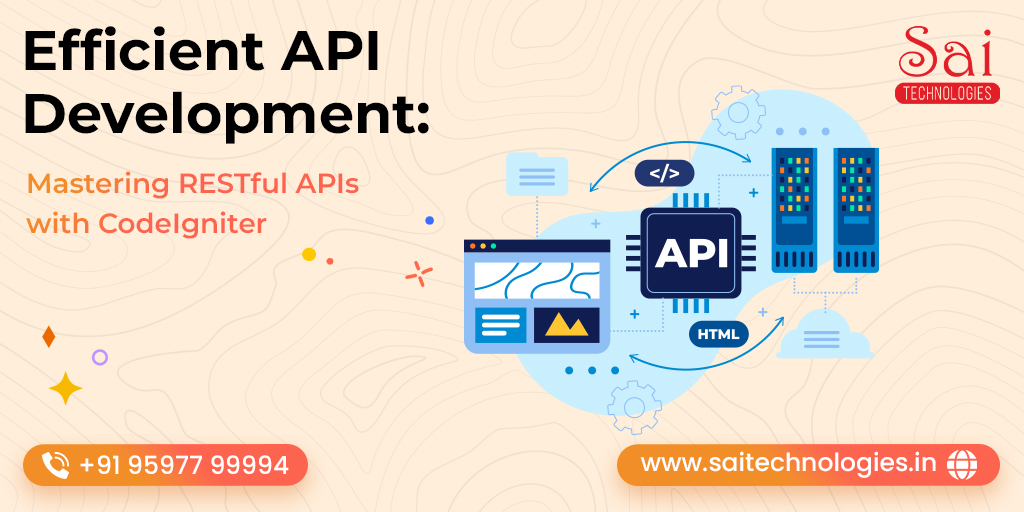Efficient API Development
Mastering RESTful APIs with CodeIgniter

In the realm of modern web development, building robust and efficient APIs (Application Programming Interfaces) is a key aspect of creating dynamic and interconnected applications. This blog post delves into the art of mastering RESTful APIs using CodeIgniter, a powerful PHP framework. Let's explore the essential concepts, best practices, and steps to achieve efficient API development with CodeIgniter.
Understanding RESTful APIs and CodeIgniter
1. Introduction to RESTful APIs:
REST (Representational State Transfer) is an architectural style for designing networked applications. RESTful APIs adhere to REST principles, emphasizing simplicity, scalability, and statelessness.
2. CodeIgniter Framework Overview:
CodeIgniter is a lightweight and flexible PHP framework known for its simplicity and performance. It provides a solid foundation for building web applications and APIs.
Setting Up Your CodeIgniter Project for API Development
1. Install CodeIgniter:
Start by installing CodeIgniter. You can download it from the official website or use composer for installation.
2. Project Structure:
Organize your CodeIgniter project with a clear structure. Create separate directories for controllers, models, and views, and consider using an additional directory for API-specific components.
Building the Foundation: Creating Controllers and Routes
1. Controller Creation:
Design dedicated controllers for your API endpoints. These controllers will handle the logic for processing requests and generating responses.
2. Routing for APIs:
Define routes in CodeIgniter to map URLs to specific controllers and methods. Create routes that align with RESTful principles, using HTTP methods (GET, POST, PUT, DELETE) for different actions.
Handling Requests and Responses
1. Request Handling:
CodeIgniter provides input and security classes to handle incoming requests. Utilize these classes to access GET, POST, and other request parameters securely.
2. Response Formatting:
Standardize your API responses. Consider using JSON as the default format for data exchange. CodeIgniter's built-in functions make it easy to format and send JSON responses.
Implementing CRUD Operations
1. Database Integration:
Integrate your API with a database using CodeIgniter's database library. Establish a connection and configure models to interact with your data.
2. CRUD Operations:
Implement CRUD (Create, Read, Update, Delete) operations using CodeIgniter models. Map these operations to corresponding HTTP methods for a RESTful approach.
Authentication and Security
1. API Authentication:
Implement secure authentication mechanisms for your API. CodeIgniter supports various authentication libraries that can be integrated to ensure authorized access.
2. Data Validation and Security:
Use CodeIgniter's form validation and security features to validate input data and protect against common security vulnerabilities such as SQL injection and cross-site scripting (XSS).
Testing Your API
1. Unit Testing:
Leverage CodeIgniter's built-in testing features to create unit tests for your API. Ensure that each component functions as expected and handles edge cases appropriately.
2. API Documentation:
Create comprehensive documentation for your API. Clearly define endpoints, request methods, parameters, and response formats. Tools like Swagger or Postman can assist in API testing and documentation.
Continuous Improvement and Maintenance
1. Logging and Monitoring:
Implement logging to track API usage and errors. Monitor performance metrics to identify areas for improvement.
2. Versioning:
Plan for API versioning to manage changes without disrupting existing clients. Include version information in your API endpoints.
Conclusion: Empowering Development with CodeIgniter
Efficient API development with CodeIgniter is not just about crafting endpoints; it's about creating a seamless bridge between applications. By mastering RESTful API development with CodeIgniter, you empower your projects with scalability, maintainability, and a standardized approach to data exchange. Embrace the principles outlined in this guide, experiment with CodeIgniter's features, and start a journey of API mastery that elevates your web development endeavors.

